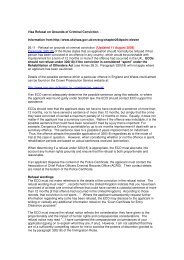Create successful ePaper yourself
Turn your PDF publications into a flip-book with our unique Google optimized e-Paper software.
and learn from a wide range of sourcesand <strong>the</strong> different experiences wherever<strong>the</strong>y may arise”.Q: A massive emphasis in coachingand coaching research is nowcurrently placed on <strong>the</strong> ‘how to’coach skills. What does good ‘howto’ coaching look like?“It is meeting <strong>the</strong> needs of <strong>the</strong> athlete interms of achieving specific learningoutcomes, planning <strong>the</strong> types of practicesor games that are deployed, andmanaging <strong>the</strong> coach’s behaviour to meet<strong>the</strong> needs of <strong>the</strong> player (i.e. when do I tell,when do I ask, and when do I saynothing). It is incredibly complicated to dothis. So good ‘how to’ coaching ispractised where: a coach is planned,prepared, aware of <strong>the</strong> learningoutcomes, organised, aware of <strong>the</strong>ir ownbehaviour, considering <strong>the</strong> players that<strong>the</strong>y are delivering to, and actuallydelivering according to <strong>the</strong> needs of <strong>the</strong>individual and group at that specific time.Everything is underpinned by a reallygood understanding of <strong>the</strong>ir athletes anda really good understanding of <strong>the</strong>ir sport,as you need to have this understandingfor appropriate delivery.I think <strong>the</strong>re has traditionally been amodel in coaching that presents <strong>the</strong>coach as a knowledgeable person whoshould impart knowledge, where <strong>the</strong>coach should be seen to be stopping <strong>the</strong>activity and intervening, and <strong>the</strong>neveryone is happy because <strong>the</strong>y havepaid <strong>the</strong>ir money for this to happen.However, <strong>the</strong>re are lots of ways todevelop knowledge, and it is not alwaysme telling someone something! Thepractice does it, asking questions does it,players thinking about <strong>the</strong>ir owndevelopment does it, and <strong>the</strong>re is a wholerange of ways of developing players, andcoaches should tap into <strong>the</strong>se methods.There is a notion about coaching that it iscoach-led and has to be done in a certainway to be recognised as coaching.Ultimately, coaches do not play <strong>the</strong>game, players play <strong>the</strong> game, so playersneed to be able to work out problemsand face dilemmas in practice and duringgames. Indeed, <strong>the</strong>re is a danger ofcoach dependency. As far as <strong>the</strong> coach isconcerned, it is really about being ‘anauthority’ ra<strong>the</strong>r than ‘in authority’, and<strong>the</strong>re is a real difference between <strong>the</strong>setwo things. The coach will have a level ofknowledge and expertise about <strong>the</strong> game,and that is a resource that players canuse. It should be about educating playersto use <strong>the</strong> resource ra<strong>the</strong>r than being toldwhat to do by <strong>the</strong> coach”.Q: If players are at <strong>the</strong> centre ofcoaching, how can you measure<strong>the</strong> effectiveness of a coach?“When I have worked with coaches Ihave talked about giving <strong>the</strong>ir playerssomething that <strong>the</strong>y didn’t have when<strong>the</strong>y arrived: a nugget of information,something about <strong>the</strong>ir technique,something about game understanding,something about lifestyle management,something that when <strong>the</strong>y walked into<strong>the</strong> session <strong>the</strong>y didn’t have before. If<strong>the</strong>y leave <strong>the</strong> session with it you haveadded value as a coach. For me, aneffective coach is someone that is ableto add value, because outcomes andwinning are fickle and not under <strong>the</strong>control of <strong>the</strong> coach”.Knowledge andexpertise is verydomain-specificQ: If you attempt to apply thisphilosophy to grass roots sport orcoaching within a participationenvironment, is it more importantfor coaches to focus on playershaving fun or players learning anddeveloping?“Having worked in a participation andcommunity type environment I am alwaysintrigued by <strong>the</strong> notion of fun andenjoyment, and what <strong>the</strong>se actually mean.If you take a young person and ask <strong>the</strong>m‘why did you have fun?’, it is probablybecause <strong>the</strong>y have learnt a new skill, or<strong>the</strong>y are able to leave a session havingdone something that <strong>the</strong>y could not dobefore, or <strong>the</strong>y are able to do somethingthat <strong>the</strong>y have seen <strong>the</strong>ir hero do ontelevision. For me that is learning andimproving <strong>the</strong>ir skills or ability. So clearlyenjoyment and fun are important, butwhat typically gives those young peoplethat fun and enjoyment? It comes fromlearning and being able to do somethingunique for <strong>the</strong> first time. That is <strong>the</strong> buzzand enjoyment that children get ra<strong>the</strong>rthan just running around and mindlesslyplaying a game for <strong>the</strong> sake of it. The realenjoyment comes from that sense ofimprovement, so <strong>the</strong>re is a real elementof coaching and learning within everyparticipation environment”.Q: In light of this discussion aboutplayer learning, what can currentresearch add to <strong>the</strong> age-old debatearound ‘game-based play’ versus‘technical development’?“Increasingly <strong>the</strong>re are ways to embedskill development within games,particularly within amended ormodified games (Teaching Games forUnderstanding / Games Sense/ Game-Based Learning). However, this doesnot mean that you should neglect skilldevelopment. More often than not youwill watch a game and <strong>the</strong> reason thatit breaks down is because <strong>the</strong>re is aproblem with <strong>the</strong> skill ra<strong>the</strong>r than <strong>the</strong>level of understanding about tacticaldecisions, about when to perform aparticular skill. So it is <strong>the</strong> skill thatneeds to be worked on and improved.Therefore, it may be that you strip down<strong>the</strong> specific game to a point where it isa skills practice (and <strong>the</strong>re is absolutelynothing wrong with doing that), but itshould not be that <strong>the</strong>re is a skillproblem, and so you get rid of absolutelyeverything and focus just on <strong>the</strong> isolatedskill. Instead, look at taking away a bit of<strong>the</strong> game at a time. That <strong>the</strong>n allows youto focus upon <strong>the</strong> specific skill within acontext that is still recognisable as <strong>the</strong>game. It may be that you end up withan unopposed skills practice, but youshould have gone through a processwhere you have explored all o<strong>the</strong>roptions first, so that this is notnecessarily your default option.Then once you see some skilldevelopment and mastery, you shouldstart building back up towards <strong>the</strong>recognisable game. It should be seen asa fluid continuum where you manipulate<strong>the</strong> practice as much as you can whilstkeeping as much of <strong>the</strong> integrity of <strong>the</strong>game as possible to focus on a particularskill”.It is important to acknowledge that<strong>the</strong> issues highlighted and discussedby Dr Cushion represent just oneperspective on coaching, but itwould be unwise to ignore <strong>the</strong>insight that research into coachingand coach education can bring.The exciting prospect is how werespond to <strong>the</strong>se real questions andchallenges in coaching.11


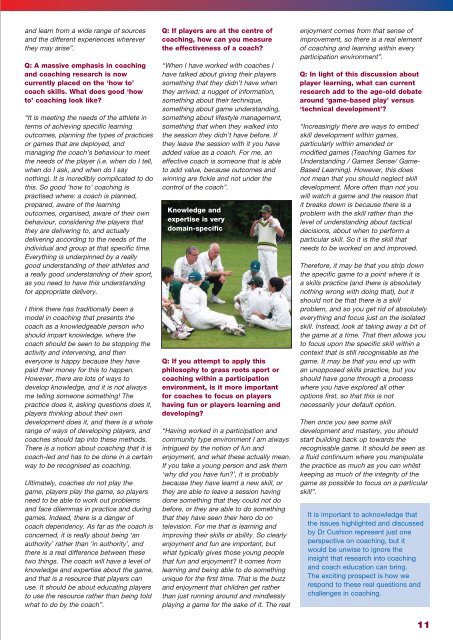
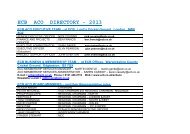

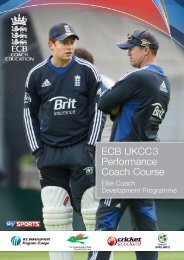


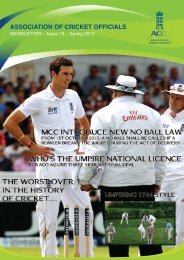
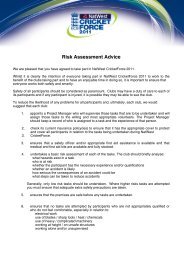
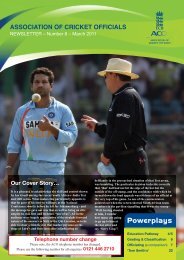
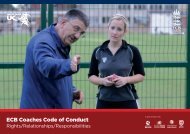

![Indoor Sports Halls with Cricket Provision [TS3] - Ecb - England and ...](https://img.yumpu.com/49070696/1/190x135/indoor-sports-halls-with-cricket-provision-ts3-ecb-england-and-.jpg?quality=85)
